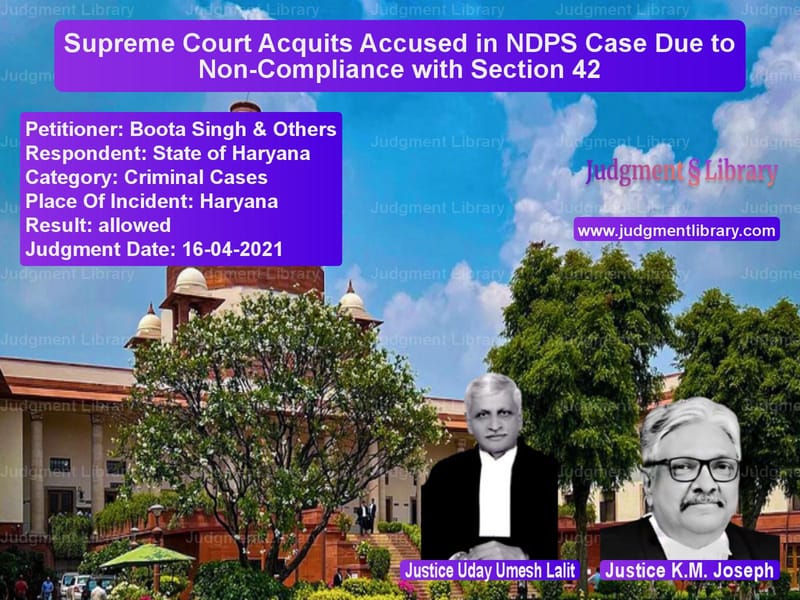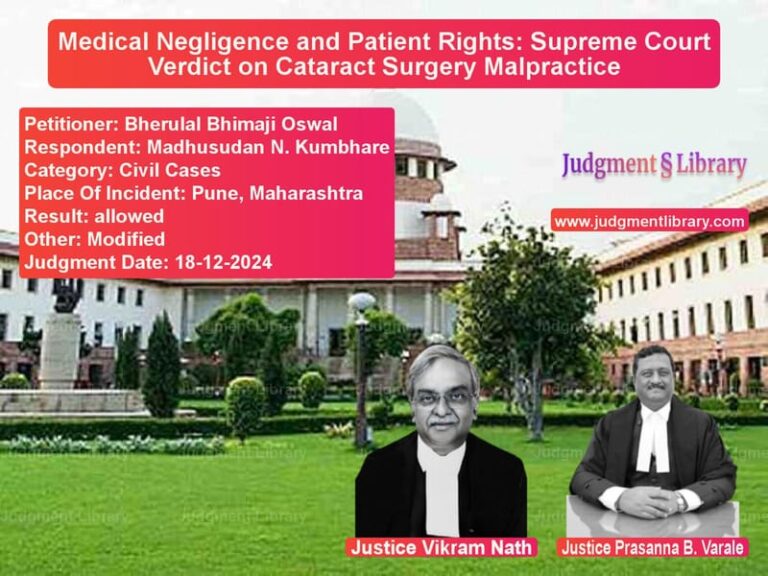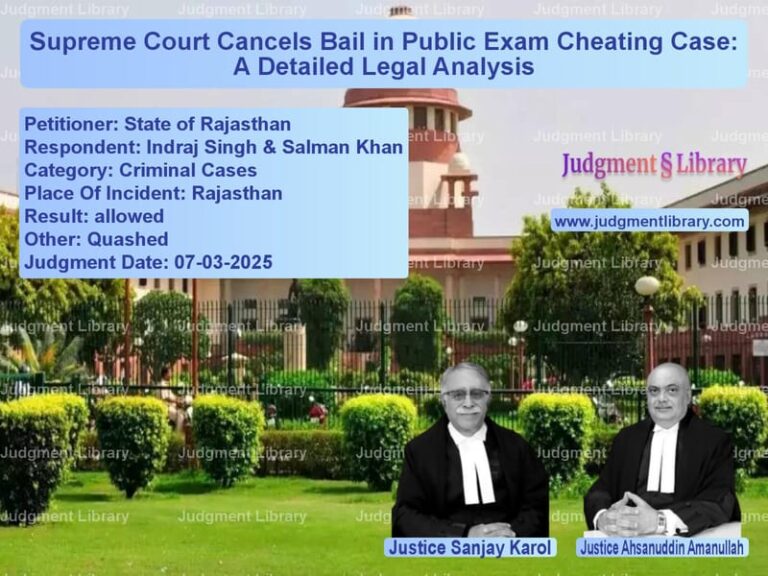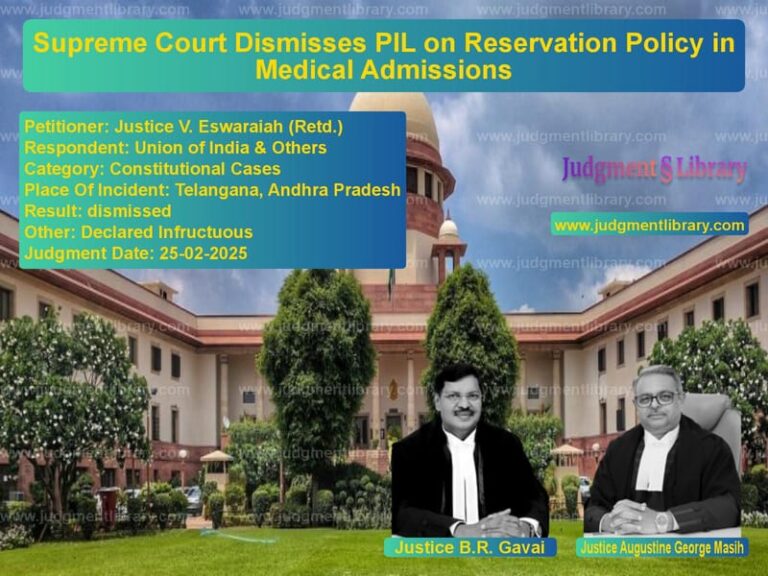Supreme Court Acquits Accused in NDPS Case Due to Non-Compliance with Section 42
The Supreme Court of India, in the case of Boota Singh & Others v. State of Haryana, acquitted three individuals convicted under the Narcotic Drugs and Psychotropic Substances Act, 1985 (NDPS Act), citing a failure by law enforcement to comply with procedural requirements under Section 42 of the Act. This ruling reinforces the importance of procedural safeguards in drug-related cases.
Background of the Case
The case originated from an alleged drug seizure on January 28, 2002, when the police arrested Boota Singh, Gurdeep Singh, and Gurmohinder Singh in a private vehicle on a public road in Haryana. They were charged under Section 15 of the NDPS Act for possession of 75 kg of poppy straw, found in two bags inside the vehicle. A fourth accused, Major Singh, managed to escape during the raid.
The Trial Court convicted the three accused and sentenced them to 10 years of rigorous imprisonment along with a fine of Rs. 1 lakh each. The Punjab and Haryana High Court upheld the conviction, leading to an appeal before the Supreme Court.
Key Issues Raised
- Whether the police complied with Section 42 of the NDPS Act, which requires mandatory procedures before conducting a search.
- Whether the trial court erred in holding that the case fell under Section 43 (public places) instead of Section 42 (private vehicles).
- Whether the evidence presented justified the conviction of the appellants.
Arguments by the Appellants (Boota Singh & Others)
- “The vehicle was a private car owned by one of the accused and not a public transport vehicle, which means the search should have complied with Section 42, not Section 43.”
- “There was total non-compliance with Section 42 as the police failed to record the secret information in writing or obtain a search warrant.”
- “As per the Supreme Court’s previous rulings, failure to comply with Section 42 makes the entire search and seizure illegal.”
Arguments by the Respondent (State of Haryana)
- “The accused were caught red-handed in possession of a commercial quantity of poppy straw, justifying their conviction.”
- “Since the accused were arrested on a public road, the case falls under Section 43, which does not require prior written recording of information.”
- “The trial court and High Court correctly ruled that the seizure was lawful and Section 42 did not apply.”
Supreme Court’s Observations and Ruling
1. Applicability of Section 42 vs. Section 43
- “The vehicle was a privately owned jeep, and as per law, private vehicles do not qualify as public places under Section 43.”
- “Since the case falls under Section 42, the investigating officer was required to comply with mandatory procedural safeguards, including recording secret information and obtaining approval from a superior officer.”
2. Non-Compliance with Section 42
- “There was a total failure to comply with Section 42, as the officer admitted he did not record the secret information in writing before conducting the raid.”
- “As per the Constitution Bench ruling in Karnail Singh v. State of Haryana, non-compliance with Section 42 is impermissible and renders the search invalid.”
3. Impact on the Conviction
- “Since the search was conducted illegally, all evidence obtained becomes inadmissible, and the accused cannot be convicted based on this search.”
- “The conviction must be set aside as the prosecution failed to follow the mandatory legal procedures required under the NDPS Act.”
Supreme Court’s Judgment
The Supreme Court ruled in favor of the appellants and:
- Set aside the convictions and sentences imposed by the lower courts.
- Ordered the immediate release of the appellants unless they were required in connection with other cases.
- Reaffirmed that procedural safeguards under the NDPS Act must be strictly followed to uphold the validity of search and seizure operations.
Key Takeaways from the Judgment
- Compliance with Section 42 is mandatory: Failure to follow prescribed procedures renders the search and seizure illegal.
- Private vehicles do not fall under Section 43: The case was wrongly categorized, leading to a legal error in conviction.
- Courts must strictly apply procedural safeguards: The NDPS Act imposes strict conditions, and any non-compliance benefits the accused.
- Evidence obtained from illegal searches is inadmissible: The prosecution cannot rely on evidence obtained through unlawful means.
Conclusion
The Supreme Court’s ruling in Boota Singh & Others v. State of Haryana sets an important precedent in cases under the NDPS Act. It underscores the necessity of strict procedural compliance by law enforcement agencies to ensure fair trials. The decision also serves as a reminder that fundamental rights must be upheld even in cases involving serious offenses like drug trafficking.
Petitioner Name: Boota Singh & Others.Respondent Name: State of Haryana.Judgment By: Justice Uday Umesh Lalit, Justice K.M. Joseph.Place Of Incident: Haryana.Judgment Date: 16-04-2021.
Don’t miss out on the full details! Download the complete judgment in PDF format below and gain valuable insights instantly!
Download Judgment: boota-singh-&-others-vs-state-of-haryana-supreme-court-of-india-judgment-dated-16-04-2021.pdf
Directly Download Judgment: Directly download this Judgment
See all petitions in Drug Possession Cases
See all petitions in Fraud and Forgery
See all petitions in Judgment by Uday Umesh Lalit
See all petitions in Judgment by K.M. Joseph
See all petitions in allowed
See all petitions in supreme court of India judgments April 2021
See all petitions in 2021 judgments
See all posts in Criminal Cases Category
See all allowed petitions in Criminal Cases Category
See all Dismissed petitions in Criminal Cases Category
See all partially allowed petitions in Criminal Cases Category







